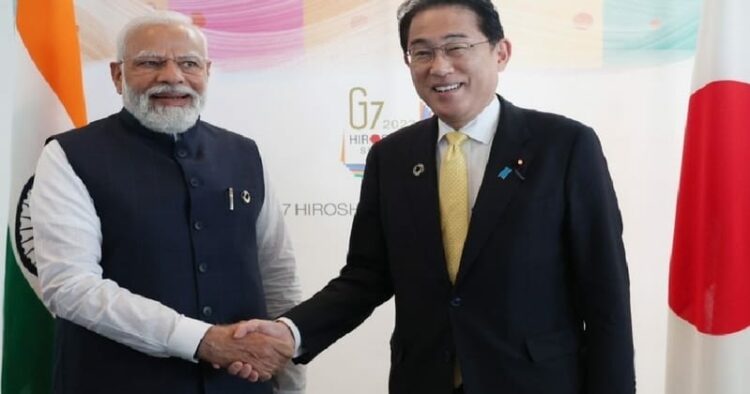New Delhi: All eyes at the global level are on the G-7 Summit being hosted by Japan in Hiroshima.
The atomic bomb debate is on expected lines. Japanese Prime Minister Fumio Kishida is hosting the annual Summit of the Group of Seven leading industrial nations. He has called the meeting “the most important in Japan’s history.” The Summit has attracted eyeballs as US President Joe Biden is also attending the Summit despite cancelling the second half of his trip because of domestic political issues.
The Quad Summit in Australia has been cancelled though efforts are on, including by India to host the Quad Leaders’ Meet at Hiroshima itself.
“The G7, once derided as a photo-op for leaders of a global order whose time has passed, has assumed new vigor and relevance in recent years,” says an edit in ‘The Japan Times’.
Notably, when formed 50 years ago, the G7 countries represented nearly two-thirds of global wealth. Today, they account for about 44 per cent of the global economy.
“The G7 summit itself, this time around, has chosen several key priorities for the current presidency. The broad terms of the G7 summit preferences, in particular, regarding their outreach with the invited
guest countries are, one – nuclear disarmament; two – on economic resilience and economic security; three – regional issues,” Indian Foreign Secretary Vinay Kwatra told reporters in a special briefing in Delhi.
Experts in Delhi as well as in Japan agree broadly that the first message of this meeting is that “security is indivisible” and that no country is safe when international rules are discarded and borders
redrawn by force. The obvious reference is to the Russian stance and the ongoing Russia-Ukraine conflict.
The parameters of ‘international rules’ are also crucial for India because New Delhi has these issues in the subcontinent with China. Japan also has maritime issues of concern.
The declaration released by the leaders will reiterate that the world benefits from a rules-based order.
The Japanese PM is likely to push for producing a clear ‘unambiguous statement that denounces the use of nuclear weapons’, especially for intimidation or in furtherance of national territorial ambitions.
In fact, before the start of the conference, Fumio Kishida said: “We will once again confirm our resolve to work for a world without nuclear weapons and we hope to transmit to the world our strong determination to protect the free and open international order based on the rule of law”.
G7 leaders have laid flowers at a memorial to the victims of the US atomic bombing of Hiroshima in a sombre opening to a summit overshadowed by fears of a potential nuclear conflict in Ukraine.
Joe Biden became the second sitting US president to visit Hiroshima, after Barack Obama in 2016. For his part, Rishi Sunak is the first British Prime Minister to visit the site of the world’s first nuclear attack.
An estimated 60,000 to 80,000 people died instantly, but by the end of the year, the death toll had risen to 140,000 as more succumbed to burns and illnesses caused by exposure to radiation.
The editorial in the Japanese newspaper also said, “There can be no nuclear blackmail or even the belief that such weapons have utility apart from deterrence. He (Japanese PM) seeks to promote nuclear
proliferation and the eventual realisation of a world without those weapons of mass destruction. The G7 leaders will be asked to endorse that vision”.
No wonder the leaders stepped forward to lay wreaths – given to them by local schoolchildren – on podiums in front of the memorial, with its eternal flame and plaque that reads: “Let all the souls here rest in peace, for we shall not repeat the evil.”
PM Modi, who will be attending the G-7 Summit as a guest of his Japanese counterpart Fumio Kishida, met his host and had an “excellent meeting”.
Had an excellent meeting with PM @kishida230 this morning. We reviewed the full range of India-Japan relations and also discussed the focus areas of India’s G-20 Presidency and Japan’s G-7 Presidency towards making our planet better. pic.twitter.com/2vFF2WQst5
— Narendra Modi (@narendramodi) May 20, 2023
“We reviewed the full range of India-Japan relations and also discussed the focus areas of India’s G-20 Presidency and Japan’s G-7 Presidency towards making our planet better,” PM Modi tweeted.

















Comments